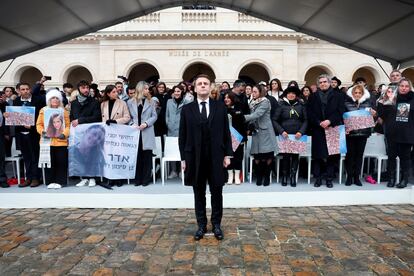France denounces ‘largest antisemitic massacre of our century’ in tribute to victims of Hamas attack
The ceremony comes after new Foreign Minister Stéphane Séjourné made his first trip to the Middle East, including Israel and the Palestinian territories, where he pushed for the release of the hostages

French President Emmanuel Macron paid tribute Wednesday to victims of Hamas’ Oct. 7 attack in Israel in a national ceremony and denounced what he described as the “largest antisemitic massacre of our century.”
Forty-two French citizens died in the attack, and three hostages are still believed to be held by Hamas and other militants in Gaza. Three empty chairs symbolized their absence.
The ceremony comes after new Foreign Minister Stéphane Séjourné made his first trip to the Middle East, including Israel and the Palestinian territories, where he pushed for the release of the hostages.
Four other French hostages have been released. A total of about 250 people were abducted in the Hamas attack and about 1,200 people, mostly civilians, were killed.
Honor guards held photographs of each victim in front of a giant screen showing their first name in the Invalides’ monumental courtyard in Paris.
Many of those killed “will never turn 30,” Macron said. “Their voices still resonate in Hebrew and French.”
The French president strongly denounced barbarity “which feeds on antisemitism and propagates it.” He said “nothing can justify or excuse this terrorism. Nothing.”
A sharp rise in antisemitic acts in France has been reported in the wake of the Oct. 7 attack. Data from the Interior Ministry and the Jewish Community Protection Service watchdog showed that 1,676 antisemitic acts were reported in 2023, compared to 436 the previous year.
The Republican Guard’s orchestra played “Kaddish” by French composer Maurice Ravel, written in 1914 based on a traditional Hebrew melody.
Yashay Dan, a relative of French Israeli hostage Ofer Kalderon, said ahead of the ceremony that he hoped it “can resonate all around the world, not only in France.”
Ayla Yahalomi Luzon, sister of French Israeli hostage Ohad Yahalomi, said: “We don’t need people to hope for us. I have hope. We need help. Ohad is a French citizen, and I ask France to make all efforts to release him and everyone.”
The families of Israeli hostages have worked for months to keep the captives’ plight in the global spotlight. In London on Wednesday, the relatives of four hostages told reporters that they warned British Prime Minister Rishi Sunak that “time is running out” for the captives’ survival amid the war in Gaza. Sunak promised to “do all we can” to win their release.
Macron said France will keep “working tirelessly to meet the aspirations for peace and security of all in the Middle East” and stressed that Israeli lives “are not the only ones that continue to be torn apart.”
France is pressing for an immediate cease-fire and a massive influx of humanitarian aid in Gaza. Séjourné described the death and destruction in the Palestinian territory as a “tragedy.”
A French team of health workers who spent two weeks in Gaza in coordination with the PalMed group returned to Paris on Tuesday after working at the European Hospital in Khan Younis, the territory’s second largest city.
“Bombing is constant, and in the past days it was getting closer to the hospital,” emergency doctor Raphael Pitti told the The Associated Press. “Shrapnel touched the hospital.”
Pitti said the situation on the ground appeared “totally hopeless,” with some patients returning weeks later with infected wounds as medical supplies run short.
Sign up for our weekly newsletter to get more English-language news coverage from EL PAÍS USA Edition
Tu suscripción se está usando en otro dispositivo
¿Quieres añadir otro usuario a tu suscripción?
Si continúas leyendo en este dispositivo, no se podrá leer en el otro.
FlechaTu suscripción se está usando en otro dispositivo y solo puedes acceder a EL PAÍS desde un dispositivo a la vez.
Si quieres compartir tu cuenta, cambia tu suscripción a la modalidad Premium, así podrás añadir otro usuario. Cada uno accederá con su propia cuenta de email, lo que os permitirá personalizar vuestra experiencia en EL PAÍS.
¿Tienes una suscripción de empresa? Accede aquí para contratar más cuentas.
En el caso de no saber quién está usando tu cuenta, te recomendamos cambiar tu contraseña aquí.
Si decides continuar compartiendo tu cuenta, este mensaje se mostrará en tu dispositivo y en el de la otra persona que está usando tu cuenta de forma indefinida, afectando a tu experiencia de lectura. Puedes consultar aquí los términos y condiciones de la suscripción digital.








































